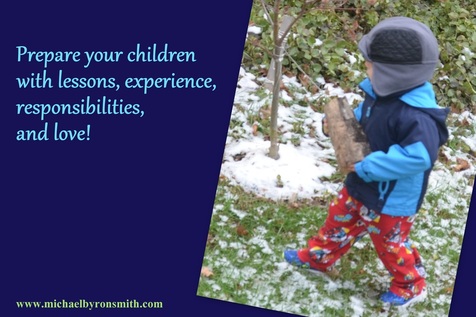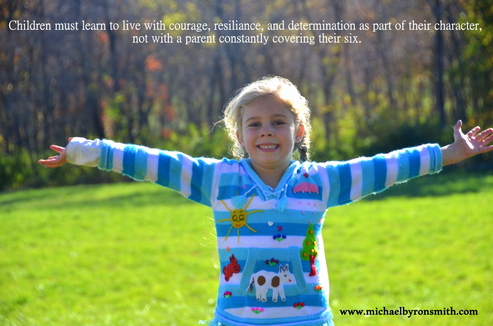 Chores teach work, accomplishment, and self-worth.
Chores teach work, accomplishment, and self-worth. Naturally you will prepare them to walk and to talk, some parents being better than others, but it will happen. There are other needs, in every stage of their life, where you can help them to be better prepared. These, of course, change as they mature.
Without going into the myriad of ways to help your children, here are examples to make you think. Some may be obvious. Others are not so obvious but could be helpful.
Safety!
Beyond teaching that stoves are hot, outlets are not to be touched and strangers can be dangerous, there are other important things for which your children can be prepared. They need to not to be afraid of those who could help them--the police for instance. Yes, they are strangers too, and while a uniform can be fake, when your child is lost or needs help, I’d want them to trust an officer and not be afraid of them. (Never tell them that police will get them if they are bad!)
Take a toddler to a firehouse to see a fireman with all his gear on. God forbid it ever happens, but if your child must be rescued by a fireman, you don’t want him to hide because he is afraid of the monster with a mask, and an ax! If in danger, you want your child to see a fireman and run or call to him.
Dating
We all know that objecting to a boyfriend can make him more desirable to your daughter. Prepare her with standards that you both agree to before she has a boyfriend. Give your daughter some characteristics of a good guy up front. For instance, is he liked by her close friends? Does he have good manners? Does he do well in school? Is he an appropriate age? Is he respectful to her?
When you talk about these qualities up front, she will look for them. If, somehow, she does find a boyfriend that doesn’t meet those standards, you can point out the reasons why you don't think he is good for her. She may then realize you are just looking out for her, and she will be less apt to rebel.
Drug use
You must talk about illicit drugs way before they are possibly exposed to being around them. If they have curiosities, talk to them. If asked why people take them, explain the best way you know how. My approach would be to tell them that some people think they will feel better for a while, but then they feel much worse and out of control of their lives later--something like flying a jet that you don’t know how to land. That approach may not work for your kids, but you need to find one that does! The point to get across is how drugs can completely ruin their lives!
Use of Smartphones
In just a few short years, smart phones have taken over many of our lives. The iPhone came out in 2007. Since then, looking at clouds and stars, talking to family, proper English, even modesty, among many other time-tested and wonderful traditions have become old fashioned. Your children will want a smartphone! While there are reasons for them to have one, the shortcomings must be addressed. It’s an earned right, not a privilege. How they earn the right is up to you, but I would use ideas that counter the downsides.
Before you allow your younger children to have a smartphone, the rules must be clear.
- Time and location limitations must be established.
- Trust but verify! Check, on a no-notice basis, the apps, texts, photos, and the usage stats. Let them know you will be doing that.
- Penalties for misuse must be agreed-to in advance and be as, or more, severe than the misuse.
Most kids don’t learn how to be responsible unless you give them a responsibility. Give them a task and see how they do. If they do well, give a little praise and add more responsibility until they fail. Then help your child to understand why they failed. It may be because you gave them too much responsibility too soon, or they reached their limit for their age. That’s okay. Admit it to them and adjust. If they failed a doable task, then you have something to work on. To ignore a failure is to accept failure.
 Photo: M.Smith
Photo: M.Smith Preparation includes dealing with daily life. But if you over-protect your kids, they will become helpless or lazy. Lessons learned first-hand are the lessons best remembered.
Children must learn to live with courage, resilience and determination as a part of their character, not with a parent covering their six. Prepare them by placing courage, resilience and determination in their character. For example;
- A better approach to protecting your child from bullies is to prepare them with skills to deal with them.
- Don’t accept excuses, push your children. But do listen to logical reasoning.
- Don’t always keep them from being hurt. They need to learn how to cope.
- Never decide the things for them that they can decide for themselves.
- Give them room to error without endangering them.
I’ve seen kids at bus stops when it was below freezing wearing shorts and no coat. If this occurred with one of my children, I would decide to let it go the first and maybe the second time to let them experience the discomfort and come to their own conclusion. If they continued, I would then intervene in two ways.
- I would then be a parent in charge and make them wear a coat for various reasons that should be obvious (write me if you don’t know the reasons).
- I would have a conversation with them to get the background on their decision. Is it peer pressure? Is it laziness? Is there a storage issue at school (doubtful)? Is it showing off in some way? What is the rationale?
By Dorothy Law Nolte, Ph.D.
If children live with criticism, they learn to condemn.
If children live with hostility, they learn to fight.
If children live with fear, they learn to be apprehensive.
If children live with pity, they learn to feel sorry for themselves.
If children live with ridicule, they learn to feel shy.
If children live with jealousy, they learn to feel envy.
If children live with shame, they learn to feel guilty.
If children live with encouragement, they learn confidence.
If children live with tolerance, they learn patience.
If children live with praise, they learn appreciation.
If children live with acceptance, they learn to love.
If children live with approval, they learn to like themselves.
If children live with recognition, they learn it is good to have a goal.
If children live with sharing, they learn generosity.
If children live with honesty, they learn truthfulness.
If children live with fairness, they learn justice.
If children live with kindness and consideration, they learn respect.
If children live with security, they learn to have faith in themselves and in those about them.
If children live with friendliness, they learn the world is a nice place in which to live.
Copyright © 1972 by Dorothy Law Nolte





